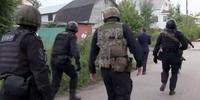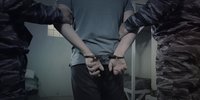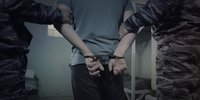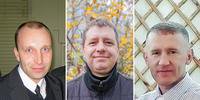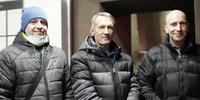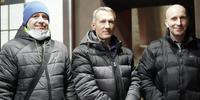Case of Vavilov and Oreshkov in Pavlovo
Filter
- #
Investigator of the Investigation Department of the FSB of Russia in the Nizhny Novgorod Region, Captain of Justice S. S. Sosunov initiates a criminal case on the fact that unidentified persons committed a crime under Part 2 of Article 35 (a crime by a group of persons by prior conspiracy who agreed in advance on the joint commission of a crime) and Part 2 of Article 282.2 of the Criminal Code of the Russian Federation.
According to the investigation, "unidentified persons, realizing a joint criminal intent, acting deliberately, by a group of persons by prior conspiracy ... took active steps aimed at... conducting religious performances and worship services."
- #
Security forces detain and interrogate local residents Aleksey Oreshkov and Aleksandr Vavilov. They are charged under Article 282.2(2).
The Pavlovsk City Court of the Nizhny Novgorod Region chooses a measure of restraint for both believers in the form of detention until 15.09.2019.
- #
- #
- #
The appellate instance of the Nizhny Novgorod Regional Court, chaired by Judge T. Sklyarova, softens the measure of restraint for Alexei Oreshkov. Considering the lawyer's complaint about the extension of the believer's detention until March 15, 2020, Sklyarova decides to change the measure of restraint to house arrest. Aleksey stayed in custody for 211 days.
- #
Aleksandr Vavilov is released from the pre-trial detention center on his own recognizance. Aleksandr was taken into custody on July 17, 2019 and all this time he was in a pre-trial detention center in the village of Druzhny, Nizhny Novgorod Region.
On the same day, the investigator changed Alexei Oreshkov's measure of restraint from house arrest to recognizance not to leave.
- #
A. A. Krupinov, senior investigator of the investigation department of the FSB of Russia in the Nizhny Novgorod region, summons 40-year-old Alexander Rakovsky for questioning. The investigator is involving a peaceful believer as a defendant in criminal case No. 11907220001000025, which has already been investigated since July 2019 against Aleksey Oreshkov and Aleksandr Vavilov. Rakovsky is charged with Part 2 of Article 282.2 of the Criminal Code of the Russian Federation, as well as, unusually, Part 2 of Article 35 ("committing a crime by an organized group"). He is chosen a measure of restraint in the form of a written undertaking not to leave.
- #
The materials of the criminal case are submitted to the Pavlovsky District Court of the Nizhny Novgorod Region for consideration by Judge Dmitry Pestov.
- #
The judge attaches to the case file certificates on the state of health of the mothers of Alexei Oreshkov and Alexander Vavilov, as well as state awards of the defendants, their characteristics from work and from neighbors, certificates for raising children.
5 witnesses are interrogated and their testimonies are read out. Four of them state that they did not inform the investigator of the information specified in the protocol. Another witness states that he does not know the defendants at all. A secret witness "Sergeev" was also questioned, which the judge refused to declassify.
- #
The questioning of witnesses is ongoing. Five claim that the testimony allegedly belonging to them and read out during the trial is 80% inconsistent with what they said to the investigator earlier. Witnesses characterize the defendants positively. A secret witness "Novikov" is also being interrogated.
- #
Another secret witness "Drozdov" is summoned for interrogation. With minor omissions, he reads out a large excerpt from the case file. The court refuses to admit the written notes of the witness to the defense.
Further, FSB officer Belenkov is interrogated in court. He claims that after the decision of the Supreme Court of April 20, 2017, the activities of the Administrative Center of Jehovah's Witnesses in Russia were recreated in the city of Pavlovo. For more detailed questions about when and how this happened, he cannot answer specifically: "In the case file there are studies and examinations of specialists who can explain everything concretely." The intelligence officer also repeatedly confirms that the religion of Jehovah's Witnesses is not prohibited.
The third witness, a woman, states that she signed only one page of the interrogation protocol, she sees all the others for the first time. She did not say the information contained there. She also says that she was pressured during the search and interrogation.
- #
In connection with the statement of some witnesses about pressure on them during interviews and interrogations, the prosecutor requests the interrogation of four FSB officers who conducted investigative actions. All of them claim that the witnesses testified voluntarily, signed all the pages of the protocols with their own hands, did not complain about their well-being, and had no comments.
Written evidence of the materials of volumes 1 and 2 of the case is examined. The prosecutor quotes the rulings to the video files: "When examining the video file, it can be understood that the above-mentioned persons sing songs to a phonogram, study the Bible, watch religious videos on a laptop, and discuss what they have studied."
A religious study of these video files, prepared by the Lobachevsky National State University, says that the recordings record the activities of Jehovah's Witnesses. However, there are no negative statements about groups of people on the basis of gender, race, nationality or attitude to religion, no encouragement of hostile actions, no statements about the superiority of any group of people over others.
- #
The court continues to examine the case materials from volumes 8 to 13, and also watch videos of worship services.
The prosecutor concludes: "These videos clearly show the organizing and coordinating role of Aleksandr Rakovsky." The defendant explains: "The video shows a common practice, which was long before the appearance of any registered legal entity in Russia, this is the fulfillment of the commandment recorded in the Bible." According to him, such activity is the realization of the right guaranteed by Article 28 of the Constitution of the Russian Federation.
- #
Judge Dmitry Pestov finds Aleksey Oreshkov, Aleksandr Rakovsky and Aleksandr Vavilov guilty of participating in extremist activities and sentences them to 3 years of suspended imprisonment.
- #
The panel of judges of the Nizhny Novgorod Regional Court, chaired by Olga Epifanova, approves the verdict to Alexei Oreshkov, Alexander Rakovsky and Alexander Vavilov. The verdict comes into force.
- #
